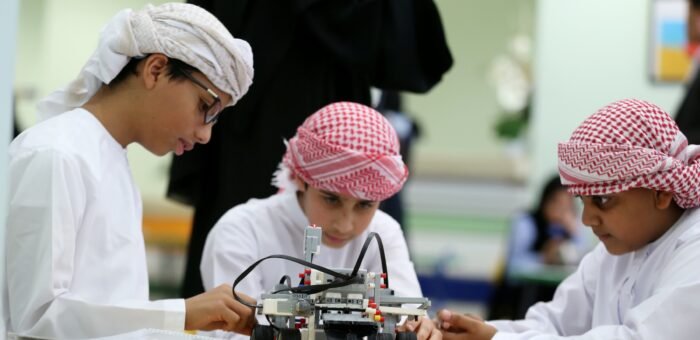
What is the UAE National Agenda 2030 education?
Introduction:
In recent years, the United Arab Emirates (also known as the UAE) has been at the forefront of development, as well as improvement and progress. A crucial framework that lays out major objectives and drivers across a variety of domains, National Agenda 2030 is an integral component of its expansive vision. One of the fundamental cornerstones that underpin this adversarial system is education. An innovative educational system that will effectively prepare children for the problems of the twenty-first century is what the UAE National Agenda 2030 Education proposes. The significance that it plays in the creation of a knowledge-based society is examined in this article, which digs into the most crucial aspects of the UAE National Agenda 2030 for Education.
I. Quality Education for All:
The UAE National Agenda 2030’s top priority is education. The UAE National Agenda 2030’s education goal calls for encouraging diversity, making high-quality education available to all residents, and making sure that all doors are equally open. The mission of the government and public authorities is to ensure that every student receives extraordinary training that will lead to professional achievement.
Efforts are being put in to improve the overall quality of education, as well as to establish new educational programs and enhance innovative academic research approaches. In order to attain this goal, the UAE is concentrating its efforts on a select few important areas, such as enhancing educator preparation and improvement, carrying out standardized evaluations, coordinating novel practices in study halls, and developing innovative work in training. The public authority intends to invest resources into professional development programs for teachers in order to improve their skills and talents, with the end goal of ensuring that the teachers are able to provide an excellent education.
II. Promoting Innovation and Creativity:
The United Arab Emirates (UAE) acknowledges the importance of innovation and creativity to the development of society as well as the expansion of the economy. Students will be better prepared to meet the challenges of a rapidly changing world if they are inculcated with a culture that values growth and entrepreneurship, as is the goal of the National Agenda 2030 Education initiative.
The United Arab Emirates (UAE) plans to cultivate in its student population the ability of problem-solving, critical thinking, and imaginative creation by including STEAM (Science, Technology, Innovation, Designing, and Engineering) disciplines into the educational curriculum and promoting project-based learning. In addition, the United Arab Emirates (UAE) is efficiently promoting extracurricular activities such as mechanical technology competitions, coding clubs, and science fairs in order to keep students interested in progressing. The United Arab Emirates (UAE) aspires to nurture a generation of young innovators who are capable of contributing to the nation’s sustainable growth and global competitiveness. To this end, the UAE is working to cultivate an ecosystem that supports innovation and entrepreneurship.
III. Embracing Sustainable Development:
The UAE National Agenda 2030 Education places a priority on sustainable development. The United Arab Emirates (UAE) plans to educate future generations to be environmentally conscientious and conscious in order to better equip them to handle the challenges posed by environmental change and asset scarcity. Students are encouraged to cultivate a sense of natural mindfulness, reasonable practices, and a sense of social obligation through their participation in the educational system. In order to accomplish this, schools all around the UAE are integrating manageability into their educational plans.
These schools are instructing pupils on the importance of protecting natural resources, as well as environmental preservation, environmentally friendly power, wasting the executives, and wasting the executives. By instilling these characteristics in students, the United Arab Emirates (UAE) hopes to contribute to the development of an age that places a greater emphasis on living a reasonable life and can help the country achieve its more extended sustainability goals.
IV. Collaboration and Global Engagement:
The United Arab Emirates (UAE) understands the significance of international cooperation and involvement in the educational sector. The goal of the National Agenda 2030 Education is to develop relationships with preeminent educational institutions located in other countries, with the intention of promoting the sharing of expert information, the conduct of collaborative research, and the launch of cooperative projects. The United Arab Emirates (UAE) is making efforts to further improve the quality and relevance of its educational system by adopting globally specified methods and making use of global abilities. In addition, assignment help services are investing resources into initiatives such as scholarships and trade projects in order to work with the mobility of students and instructors. The United Arab Emirates (UAE) intends to support people with global skills who are able to succeed in a world that is increasingly interconnected by providing open doors to global openness and cultural learning experiences.
Conclusion:
A daring and game-changing vision for the country’s educational system can be found in the UAE National Agenda 2030 Education. The United Arab Emirates (UAE) has the goal of preparing its younger generation for the challenges and opportunities that lie ahead by placing an emphasis on quality, development, supportability, and global commitment. The United Arab Emirates (UAE) is laying the framework for an information-based society through the purposeful efforts and essential speculations that are being made there. This society will foster inventiveness, definite reasoning, and a vow to a practical turn of events. Education in accordance with the National Agenda 2030 is intended to stimulate people’s interest in the future and provide them the ability to help design a more dazzling and successful future for the UAE and beyond.

Leave a Reply